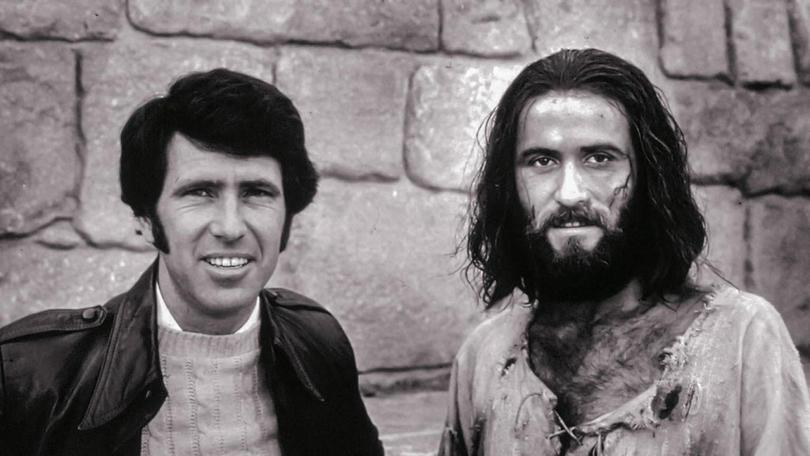Editor’s note: Paul Eshleman was the founding director of Jesus Film Project, a ministry that translates and distributes the "JESUS" film (1979), the most translated and viewed film in history. His extraordinary vision and the intricate production and worldwide distribution of the JESUS Film were chronicled in his book I Just Saw JESUS, which recently saw the release of a new edition to commemorate the 40th anniversary of the release of the "JESUS" film.
As Jesus Film Project continues to reimagine the "JESUS" film for today’s generation, China Christian Daily interviewed Jennifer Huff, Eshleman’s daughter and author of the new foreword of I Just Saw JESUS.
Currently serving as the communication coordinator for her.BIBLE, a ministry of Cru offering an audio Bible in the New Living Translation voiced entirely by women in diverse and comforting tones, Huff shared her thoughts on the enduring relevance of I Just Saw JESUS and the "JESUS" film, and how the reimagined version might shape the faith of a new generation.
China Christian Daily: As the author of the new foreword of I Just Saw JESUS, what key message do you hope to convey to readers?
Jennifer Huff: As I wrote the foreword to I Just Saw JESUS, I wanted to highlight the extraordinary legacy of the "JESUS" film. This book captures the miraculous journey of how the film went from its bold vision to the intricate production, and then its phenomenal worldwide distribution. But this book isn't just history. It's a legacy of God's faithfulness and the dedication of people who are willing to step out in faith.
More than that,I hope that readers come away with a renewal of hope in the power of Jesus to change lives. My prayer is that this book would ignite or reignite a passion in readers to not only embrace the power of Jesus in their own lives but to boldly share Jesus with a world that is still yearning for hope.
China Christian Daily: Today's world is really different from the world 40 years ago, how do you think I Just Saw JESUS will resonate with people today?
Jennifer Huff: I believe that even 40 years later, I Just Saw JESUS remains powerful because it captures time stories of transformation. My father was such a gifted storyteller, and the way he shared these moments still allowed people to experience them across the generations.
These stories just aren't about a film. They're about lives that are changed forever by the message of Jesus. This book reminds us God is still at work, and the message of Jesus is as vital and life-changing now. The film just passed 2,200 languages that have been translated, and the stories themselves, the tribes, the families, and the individuals encountering Christ in their whole own heart language are a testament once again to the transforming power of the gospel.
China Christian Daily: In your opinion, what made the "JESUS" film the most translated and widely viewed film in history? What sets it apart?
Jennifer Huff: The incredible accuracy of the "JESUS" film sets it apart. Filmed close to the original locations, it faithfully follows the Gospel of Luke, bringing Scripture to life without adding or taking anything away.
The key to the worldwide impact is the awesome, incredible commitment to translating and debiting it into now over 2200 languages. The "JESUS" film's true power lies in its ability to make the gospel known to every tribe, tongue, and nation. Because it is in their heart language, it shows that the love of Jesus is personal to each person and is meant for every heart.
My father's favorite and most quoted verse to me was Matthew 24:14, "This Gospel of the kingdom will be preached in the whole world as a testimony to all nations, and then the end will come." He knew how important it was for people to hear the message of Jesus in their heart language. Without that, people might conclude that they can't belong to Jesus; it's only for people who speak that language.
One of my favorite stories in I Just Saw JESUS illustrates this. Among the Garifuna people, a common cultural greeting between adults and children is, "What are you doing?" The children typically respond, "Nothing." It’s similar to how Americans greet each other with, "How are you?" and reply, "Fine." The translators included this in their dubbing of the "JESUS" film. When the people saw that greeting, they cried out, "Jesus speaks Garifuna?" That moment demonstrates the power of hearing the gospel in a way that feels intimate and personal. It says, "Jesus speaks directly to me."
China Christian Daily: How do you envision the upcoming animated film "JESUS" impacting people’s lives in this new generation?
Jennifer Huff: Before my father died, he made the last promotional video, encouraging people to give generously toward the new animated "JESUS" film. Even in his final months, he talked about reaching Generation Z and Generation Alpha. He knew the importance of every generation and he believed deeply in the power of innovation, creativity, and technology to share the gospel. So the animated "JESUS" film is taking that mission forward.
The reimagined film offers an immersive experience that will utilize AR and other emerging technologies that will make the story of Jesus come alive in a way that will speak directly to this generation, children and adults alike, capturing their attention in a way that the original 1979 film maybe wouldn't. And yet, like the original, the new film will be able to use eventually in the 2,200 languages that have already been dubbed up, ensuring that its life-changing message is accessible to people everywhere.
China Christian Daily: Do you know any story about the "JESUS" film with China?
Jennifer Huff: I will never forget the first time that my father brought a pastor to the United States from China to share how the gospel was exploding through the use of the "JESUS" film. I believe my father made 50 trips to China and would meet with people who would stay up late at night and have replication centers under their beds to create more and more videotapes to be able to pass out. They realized that they needed lots of different dialects of Mandarin and wanted to ensure that every group of people in China was represented.
[The JesusFilm app offers 14 Chinese versions of the "JESUS" film (1979), including Simplified Chinese, Traditional Chinese, and 12 dialects such as Xiang, Foochow, Teochew, Hui, Hokkien Amoy, and more.]











